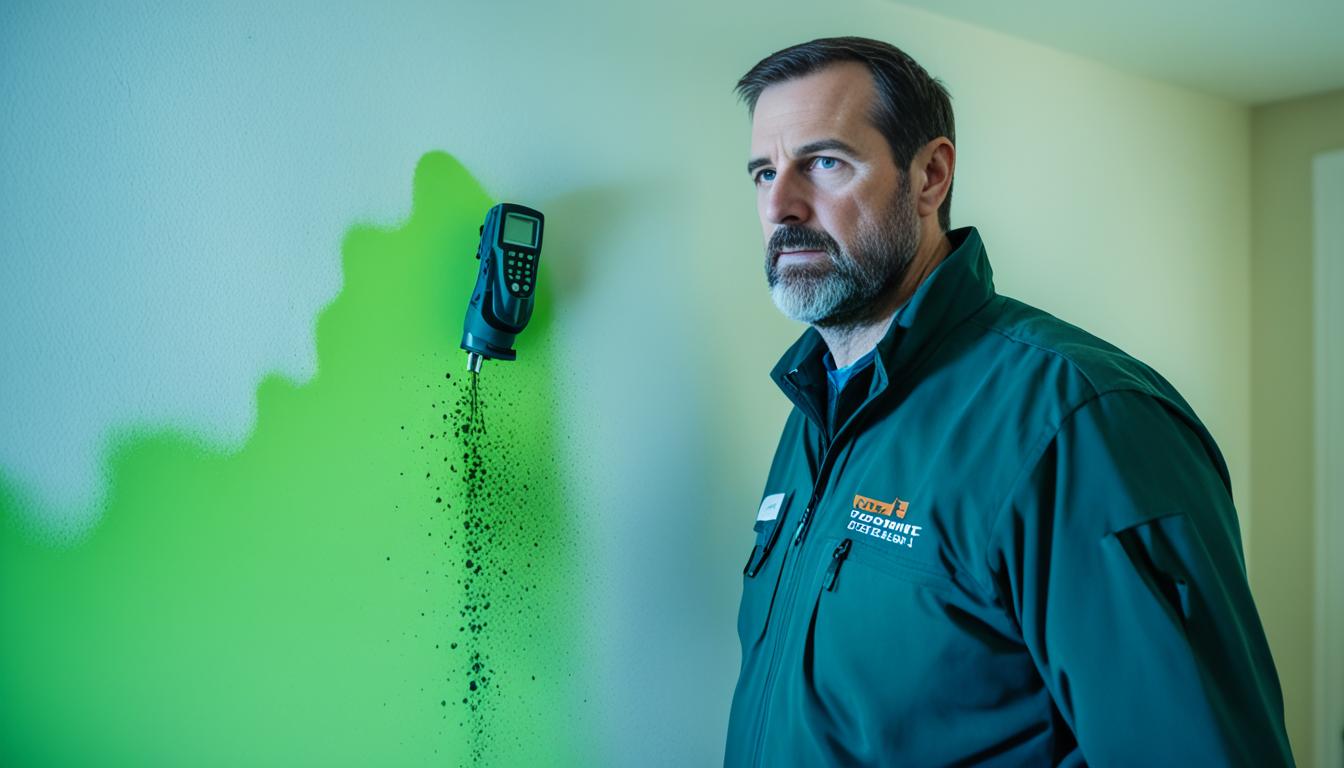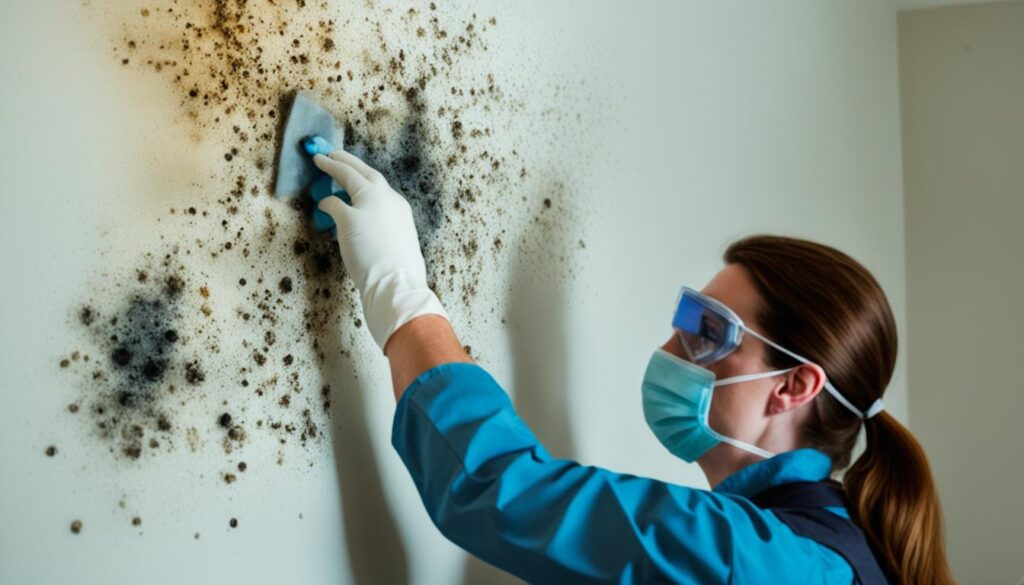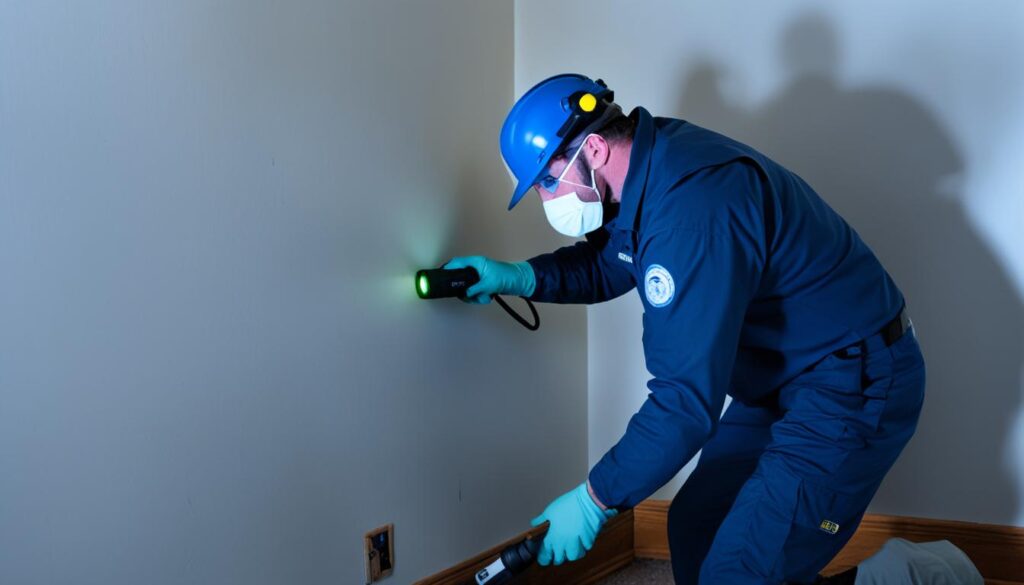
Home Inspectors and Mold Detection: A Guide
Welcome to our comprehensive guide on home inspectors and mold detection. When purchasing a new home or ensuring the safety of your current one, it’s essential to consider the presence of mold. In this article, we will address common questions such as “Do Home Inspectors check for mold?” and discuss the benefits of hiring a Home Inspector for mold assessments. We will also explore the importance of mold testing during Home Inspections and provide valuable insights on choosing the right professional for the job.
Key Takeaways:
- Home inspectors play a crucial role in mold detection during the home inspection process.
- Mold inspections are vital for maintaining a safe and healthy living environment.
- Hiring a home inspector who specializes in mold assessments can provide expert insights and recommendations.
- Preventing and addressing mold issues promptly can prevent further damage and potential health risks.
- If you suspect mold growth in your property, it is advisable to contact a professional mold assessment service.
Understanding Mold Inspection during Home Inspections
In order to maintain a safe and healthy living environment, it is crucial to address the issue of mold growth. Mold can cause various health problems and can even compromise the structural integrity of a property. That is why mold inspection during home inspections plays a vital role in identifying and detecting any signs of mold infestation.
Home inspectors are trained professionals who assess the overall condition of a property. While their primary focus is to inspect the structural integrity and safety of a home, they also include mold inspection as part of their comprehensive assessment. Mold detection by home inspectors is an essential component of the inspection process, ensuring that potential mold issues are identified and addressed appropriately.
During a home inspection, a certified home inspector will carefully examine all accessible areas of a property, including basements, crawl spaces, attics, and other areas prone to moisture. They will look for visible signs of mold growth, such as discoloration, water stains, and musty odors. Additionally, they will assess the humidity levels, ventilation, and overall moisture conditions of the property, as these factors contribute to mold development.
The importance of mold inspection in home inspections cannot be emphasized enough. Mold growth can cause serious health problems, particularly for individuals with respiratory conditions or weakened immune systems. Mold spores can become airborne and circulate throughout the property, potentially leading to allergic reactions, respiratory issues, and other health complications. By conducting mold inspections, home inspectors play a key role in ensuring the safety and well-being of homeowners.
Benefits of Mold Inspection by Home Inspectors:
- Early Detection: Home inspectors are trained to spot even the subtlest signs of mold growth, preventing the issue from escalating and causing further damage.
- Identification of Underlying Issues: Mold growth is often a symptom of underlying moisture problems, such as leaks or poor ventilation. Home inspectors can identify these issues and provide recommendations for remediation.
- Peace of Mind: By conducting mold inspections during home inspections, homeowners can have peace of mind knowing that their property is free from mold infestation, providing a safe and healthy environment for themselves and their families.
Next, we will discuss the process of choosing a home inspector specifically for mold assessments and the importance of hiring a qualified professional in effectively addressing mold issues.

Choosing a Home Inspector for Mold Assessments
When it comes to assessing mold issues during home inspections, it’s crucial to hire a qualified professional who specializes in mold assessments.
Hiring a Home Inspector for mold can provide you with the expertise needed to identify and address mold problems effectively. Here are some key factors to consider when choosing a home inspector for mold assessments:
- Qualifications and Certifications: Look for a home inspector who holds relevant certifications in mold assessment and remediation. These certifications ensure that the inspector has undergone proper training and possesses the necessary knowledge to handle mold-related issues.
- Experience: It’s important to hire a home inspector with experience in mold prevention and remediation. An experienced inspector will be familiar with common mold problems, potential hiding spots, and effective remediation techniques.
- References and Reviews: Take the time to research and read reviews or testimonials from previous clients. This will give you an idea of their reputation and the quality of their work.
Remember, Mold assessment in Home Inspections is a specialized field, so it’s essential to choose a home inspector who has the necessary expertise and knowledge to effectively assess and address mold issues.
The Importance of Mold Detection
Mold can have serious health implications and can cause extensive damage to your property if left untreated. A comprehensive mold assessment by a qualified home inspector can uncover hidden mold growth, identify sources of moisture, and provide recommendations for remediation.
“Mold can have a significant impact on indoor air quality and can exacerbate respiratory conditions such as asthma and allergies. It’s important to address mold issues promptly to protect the health and well-being of your family.”
By choosing a home inspector with expertise in mold assessments, you can proactively identify and address mold issues, ensuring a safe and healthy living environment for you and your loved ones.
Table: Qualifications and Certifications to Look for in a Home Inspector
| Qualification/Certification | Description |
|---|---|
| Certified Mold Inspector (CMI) | Earned by completing a comprehensive training program and passing an examination, demonstrating knowledge of mold assessment and inspection practices. |
| Certified Mold Remediation Contractor (CMRC) | Certification for professionals who specialize in mold remediation, indicating expertise in safely removing and preventing mold growth. |
| Indoor Air Quality Association (IAQA) Certification | Certification offered by the IAQA, demonstrating proficiency in diagnosing, assessing, and remediating indoor air quality issues, including mold. |
Hiring a qualified home inspector for mold assessments is an investment in your home’s health and your family’s well-being. By ensuring that the inspector has the necessary qualifications, experience, and expertise in mold prevention and remediation, you can have peace of mind knowing that any mold issues will be addressed promptly and effectively.
Preventing and Addressing Mold Issues
Mold growth can pose significant health risks and damage to your home. To maintain a healthy living environment, homeowners should take proactive measures to prevent mold and address existing mold issues. Home inspectors play a crucial role in providing recommendations for mold prevention and remediation during home inspections.
The Role of Home Inspectors in Mold Prevention
During a home inspection, a qualified home inspector will assess various areas of your property for signs of mold growth. They will carefully inspect areas prone to moisture accumulation, such as basements, attics, bathrooms, and crawl spaces. By identifying potential moisture sources, home inspectors can offer valuable guidance on preventing mold from taking hold.
Home inspectors may recommend the following preventive measures:
- Ensure proper ventilation: Proper ventilation is essential in areas prone to humidity, such as bathrooms and kitchens. Installing exhaust fans or using dehumidifiers can help reduce moisture levels and discourage mold growth.
- Address water leaks: Home inspectors will check for any signs of water leaks or plumbing issues that could contribute to mold growth. It’s important to promptly repair leaks to prevent water accumulation and potential mold problems.
- Maintain proper drainage: Home inspectors will inspect the exterior of your home to ensure that proper drainage systems are in place. Good drainage prevents water from seeping into the foundation or basement, minimizing the risk of mold growth.
- Control indoor humidity: Home inspectors may recommend maintaining indoor humidity levels below 60%. Using air conditioners, dehumidifiers, and proper insulation can help regulate humidity and prevent excessive moisture that promotes mold growth.
Addressing Existing Mold Issues
If your home already has mold issues, it’s crucial to address them promptly. Home inspectors can provide recommendations for remediation and connect you with qualified professionals who specialize in mold removal. They may advise the following steps:
- Hiring a professional mold remediation service: When dealing with significant mold growth, it’s best to enlist the services of a professional mold remediation company. These experts have the knowledge, tools, and experience to safely and effectively remove mold from your home.
- Fixing the source of moisture: Addressing the source of moisture is essential to prevent recurring mold problems. Home inspectors can help identify and recommend repairs for leaks, faulty plumbing, or inadequate ventilation contributing to mold growth.
- Cleaning and disinfecting affected areas: In cases where the mold growth is minimal, homeowners may be able to clean and disinfect the affected areas themselves. Home inspectors can provide guidance on suitable cleaning solutions and techniques.
- Monitoring for future mold growth: Home inspectors can advise homeowners on monitoring their property for signs of mold in the future. Regular inspections and vigilance can help prevent mold problems from reoccurring.
By following the recommendations of home inspectors and taking proactive measures to prevent mold, homeowners can ensure a safe and healthy living environment for their families. Remember, early detection and mitigation are key to preventing extensive damage and health risks associated with mold growth.

Conclusion
In conclusion, this guide has highlighted the significance of mold detection during home inspections. Mold growth can have severe health implications and cause extensive damage to your property if left unchecked. If you suspect mold growth in your property, it is important to take immediate action.
For professional mold assessments, prevention, and remediation services in Miami, look no further than Fix Mold Miami. With their extensive expertise in mold detection and remediation, Fix Mold Miami can provide you with the necessary solutions to ensure a mold-free and healthy living environment.
To schedule a mold assessment or learn more about their services, contact Fix Mold Miami at 305-465-6653. Their team of mold specialists will guide you through the assessment process and recommend the most appropriate course of action to address any mold issues effectively.




